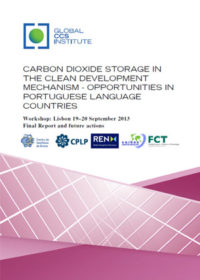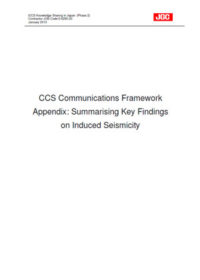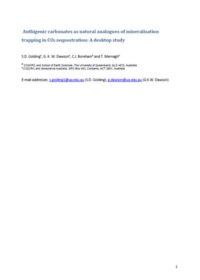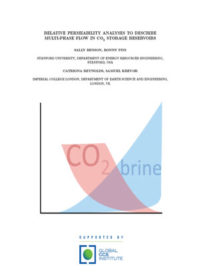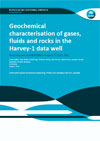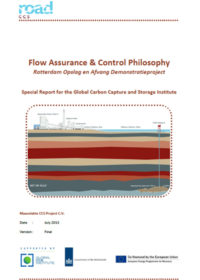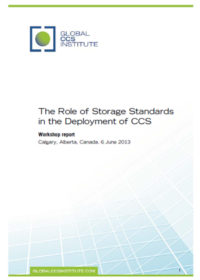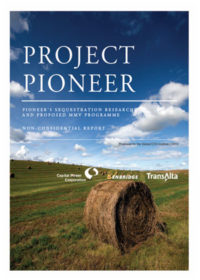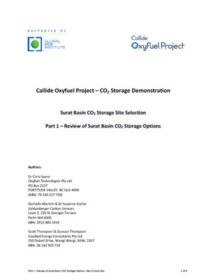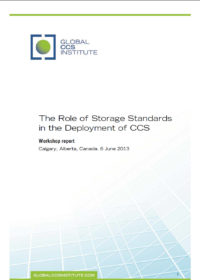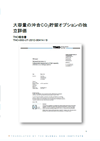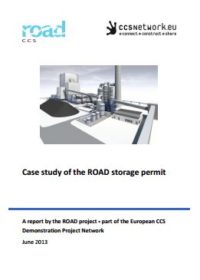Resources
Publications
Our publications, reports and research library hosts over 500 specialist reports and research papers on all topics associated with CCS.
View our Publication Library Disclaimer.
Filter by
Carbon dioxide storage in the Clean Development Mechanism: opportunities in Portuguese language countries. Workshop: Lisbon 19-20 September 2013. Final report and future actions
20th September 2013
Topic(s): Capacity development, Carbon capture use and storage (CCUS), CO2 storage
The first workshop about cooperation on carbon dioxide capture and storage (CCS) among the community of Portuguese language countries (the CPLP) was held in Lisbon, on the 19th and 20th of September 2013, at the CPLP headquarters. The workshop focused on the dissemination of knowledge about CCS, discussion around the current stage of development of the technology and identification of opportunities for cooperation among the CPLP countries. The programme of the workshop is included in Annex A.
Disclaimer
The content within the Global CCS Institute Publications, Reports and Research Library is provided for information purposes only. We make every effort and take reasonable care to keep the content of this section up-to-date and error-free. However, we make no claim as to its accuracy, currency or reliability.
Content and material featured within this section of our website includes reports and research published by third parties. The content and material may include opinions and recommendations of third parties that do not reflect those held by the Global CCS Institute.
CCS communications framework appendix: Summarising key findings on induced seismicity
20th August 2013
Topic(s): CO2 storage
This report examines whether there is a correlation between CCS and seismicity through a review of key existing literature on the subject. This report is a contribution to the second phase of a project being undertaken for the Global Carbon Capture and Storage Institute (GCCSI) entitled “Development of Knowledge Sharing Framework for Japan”.
Disclaimer
The content within the Global CCS Institute Publications, Reports and Research Library is provided for information purposes only. We make every effort and take reasonable care to keep the content of this section up-to-date and error-free. However, we make no claim as to its accuracy, currency or reliability.
Content and material featured within this section of our website includes reports and research published by third parties. The content and material may include opinions and recommendations of third parties that do not reflect those held by the Global CCS Institute.
Authigenic carbonates as natural analogues of mineralisation trapping in CO2 sequestration: a desktop study
9th August 2013
Topic(s): Carbon capture use and storage (CCUS), CO2 storage
Disclaimer
The content within the Global CCS Institute Publications, Reports and Research Library is provided for information purposes only. We make every effort and take reasonable care to keep the content of this section up-to-date and error-free. However, we make no claim as to its accuracy, currency or reliability.
Content and material featured within this section of our website includes reports and research published by third parties. The content and material may include opinions and recommendations of third parties that do not reflect those held by the Global CCS Institute.
Relative permeability analysis to describe multi-phase flow in CO2 storage reservoirs
7th August 2013
Topic(s): Carbon capture use and storage (CCUS), CO2 storage
The purpose of this report is to provide an explanation of the different methods used to measure relative permeability and to provide an objective review of comparable methodologies. The report will also include the identification of data gaps and the requirements to obtain additional material to provide a complete library of relative permeability measurements in varying brine compositions and rock types to represent as complete a suite of potential storage sites as possible.
Disclaimer
The content within the Global CCS Institute Publications, Reports and Research Library is provided for information purposes only. We make every effort and take reasonable care to keep the content of this section up-to-date and error-free. However, we make no claim as to its accuracy, currency or reliability.
Content and material featured within this section of our website includes reports and research published by third parties. The content and material may include opinions and recommendations of third parties that do not reflect those held by the Global CCS Institute.
Geochemical characterisation of gases, fluids and rocks in the Harvey-1 data well
1st August 2013
Topic(s): Carbon capture use and storage (CCUS), CO2 storage
The Harvey-1 stratigraphic well, drilled in 2012 as a part of the evaluation of the area in South West Western Australia for a suitable carbon storage site, has undergone a geochemical evaluation. Two gas samples from the potential source of CO2 (CSBP and BOC in Kwinana) that may be piped south for a pilot scale test have been analysed and found to contain almost pure CO2, in excess of 98.3 mol.% with little in the way of organic contaminants. The carbon isotopic composition of this gas is 13C -37.6 ± 0.28 ‰, which is quite distinct from other background natural sources of CO2 and might act as a tracer in the future. Oxygen isotope data from the CO2 have been collected to build the database of information that can be used to understand trapping mechanisms and their contribution in the future.
Organic analyses were conducted on a series of core plugs and on some drilling fluids from equivalent depths. Extraction of the core plugs showed that while there was some hydrocarbons present in both the core and drilling fluids, the richest core sample has only a total extractable organic matter content of 304.93 mg/kg rock. The volumes measured were insignificant compared with source rock extracts or amounts seen in sandstone dominated hydrocarbon reservoirs which might contain upwards of 100,000 mg/kg rock. These low volumes indicate that there is no active source rock of quantitative significance in the immediate area of this well and means that there is unlikely to be any form of basin resource conflict in relation to oil or gas finds in the immediate area.
In conclusion, this current geochemical evaluation of the Harvey-1 well has used a combination of standard and novel techniques to show that the geology in this area appears suitable for geological storage of CO2 .
Disclaimer
The content within the Global CCS Institute Publications, Reports and Research Library is provided for information purposes only. We make every effort and take reasonable care to keep the content of this section up-to-date and error-free. However, we make no claim as to its accuracy, currency or reliability.
Content and material featured within this section of our website includes reports and research published by third parties. The content and material may include opinions and recommendations of third parties that do not reflect those held by the Global CCS Institute.
Flow assurance & control philosophy: Rotterdam Opslag en Afvang Demonstratieproject. Special report for the Global Carbon Capture and Storage Institute
31st July 2013
Topic(s): Carbon capture use and storage (CCUS), CO2 storage, CO2 transport, Health safety and environment
One of the key challenges for a large scale CCS demonstration project, like the ROAD project in the Netherlands, is to safely and efficiently operate the CO2 stream of an integrated CCS chain. For ROAD this means: capturing the CO2 from the flue gases of a coal-fired power plant, compressing and transporting the CO2 through a 25 km pipeline to an offshore platform and injecting the CO2 into a depleted gas reservoir 3.5 km below the sea bed.
This special report on the ‘Flow Assurance and Control Philosophy’ of the ROAD project provides an insight into the proposed control and operating systems for the CO2 stream of the integrated CCS chain in steady state, shutdown and start-up conditions.
Although it has not been practiced before, the Flow Assurance Study (FAS) conducted by ROAD has clearly shown that filling a reservoir of (very) low pressure to an end pressure of 300 bar is in practice possible, but one has to study the behaviour of CO2 in all its thermo-dynamic aspects with the parameters of the physical configuration of the transport system.
Disclaimer
The content within the Global CCS Institute Publications, Reports and Research Library is provided for information purposes only. We make every effort and take reasonable care to keep the content of this section up-to-date and error-free. However, we make no claim as to its accuracy, currency or reliability.
Content and material featured within this section of our website includes reports and research published by third parties. The content and material may include opinions and recommendations of third parties that do not reflect those held by the Global CCS Institute.
The role of storage standards in the deployment of CCS: workshop report
26th July 2013
Topic(s): Carbon capture use and storage (CCUS), CO2 storage
The Institute hosted a workshop on 6 June 2013 in Calgary, Alberta, bringing together stakeholders from industry, government, non-government organisations and academia to discuss the role of storage standards in the deployment of CCS. The workshop focused on the implementation of CSA Z741, the standard for the geologic storage of CO2 for Canada and the United States.
Disclaimer
The content within the Global CCS Institute Publications, Reports and Research Library is provided for information purposes only. We make every effort and take reasonable care to keep the content of this section up-to-date and error-free. However, we make no claim as to its accuracy, currency or reliability.
Content and material featured within this section of our website includes reports and research published by third parties. The content and material may include opinions and recommendations of third parties that do not reflect those held by the Global CCS Institute.
Project Pioneer. Pioneer’s sequestration research and proposed MMV programme: non-confidential report
23rd July 2013
Topic(s): Carbon capture use and storage (CCUS), CO2 storage
Disclaimer
The content within the Global CCS Institute Publications, Reports and Research Library is provided for information purposes only. We make every effort and take reasonable care to keep the content of this section up-to-date and error-free. However, we make no claim as to its accuracy, currency or reliability.
Content and material featured within this section of our website includes reports and research published by third parties. The content and material may include opinions and recommendations of third parties that do not reflect those held by the Global CCS Institute.
Callide Oxyfuel Project: Surat Basin CO2 storage site selection. Part 1: review of Surat Basin CO2 storage options
27th June 2013
Topic(s): Carbon capture use and storage (CCUS), CO2 storage
Mt pa). The report includes the following: 1. Description of the assessment methodology applied. 2. Description of general geology of the areas. 3. Characterisation and ranking of the sites in terms of Social and Environmental factors; access and infrastructure; injectivity, storage capacity, containment. 4. Summary of data in appendices based on various cores and bore holes that are available in the public domain, including stratigraphic profiles, and hydrological data.
Disclaimer
The content within the Global CCS Institute Publications, Reports and Research Library is provided for information purposes only. We make every effort and take reasonable care to keep the content of this section up-to-date and error-free. However, we make no claim as to its accuracy, currency or reliability.
Content and material featured within this section of our website includes reports and research published by third parties. The content and material may include opinions and recommendations of third parties that do not reflect those held by the Global CCS Institute.
Calgary-US storage standards workshop report
6th June 2013
Topic(s): Carbon capture use and storage (CCUS), CO2 storage
The Institute hosted a workshop on 6 June 2013 in Calgary, Alberta, bringing together stakeholders from industry, government, non-government organisations and academia to discuss the role of storage standards in the deployment of CCS. The workshop focused on the implementation of CSA Z741, the standard for the geologic storage of CO2 for Canada and the United States.
Disclaimer
The content within the Global CCS Institute Publications, Reports and Research Library is provided for information purposes only. We make every effort and take reasonable care to keep the content of this section up-to-date and error-free. However, we make no claim as to its accuracy, currency or reliability.
Content and material featured within this section of our website includes reports and research published by third parties. The content and material may include opinions and recommendations of third parties that do not reflect those held by the Global CCS Institute.
ISAのフェーズ3は、商業ベースのCCS大規模普及の後押しとなるべく、大容量沖合貯留の利用可能性に更なる確実性をもたらすとともに、潜在的なCCSプロジェクト開発者に、プロジェクトを遂行した場合の長期的実行可能性についてより大きな信頼感を提供することを目的としている。これらの目的は、オランダ政府による陸上CO2貯留に遅延が生じているため、さらに重要性を増している。
Disclaimer
The content within the Global CCS Institute Publications, Reports and Research Library is provided for information purposes only. We make every effort and take reasonable care to keep the content of this section up-to-date and error-free. However, we make no claim as to its accuracy, currency or reliability.
Content and material featured within this section of our website includes reports and research published by third parties. The content and material may include opinions and recommendations of third parties that do not reflect those held by the Global CCS Institute.
Case study of the ROAD storage permit
1st June 2013
Topic(s): Carbon capture use and storage (CCUS), CO2 storage, Permitting
Disclaimer
The content within the Global CCS Institute Publications, Reports and Research Library is provided for information purposes only. We make every effort and take reasonable care to keep the content of this section up-to-date and error-free. However, we make no claim as to its accuracy, currency or reliability.
Content and material featured within this section of our website includes reports and research published by third parties. The content and material may include opinions and recommendations of third parties that do not reflect those held by the Global CCS Institute.
